Assertion : The leaves in gymnosperms are well adapted to withstand extremes of temperature, humidity and wind
Reason : Unlike bryophytes and pteridophytes, in gymnosperms the male and female gametophytes do not have an independent free living existence.
both true but reason is not correct explanation
assertion true but reason in wrong
both are wrong
both are wrong.
The correct Answer is:A
To solve the question, we need to analyze both the assertion and the reason provided.
1. Understanding the Assertion:
- The assertion states that "The leaves in gymnosperms are well adapted to withstand extremes of temperature, humidity, and wind."
- This is true. Gymnosperms, particularly conifers, have needle-like leaves that are adapted to survive in harsh environmental conditions.
2. Understanding the Reason:
- The reason states that "Unlike bryophytes and pteridophytes, in gymnosperms the male and female gametophytes do not have an independent free-living existence."
- This statement is also true. In gymnosperms, the male and female gametophytes develop within the reproductive structures of the sporophyte and do not exist independently as they do in bryophytes and pteridophytes.
3. Analyzing the Relationship:
- While both the assertion and the reason are true, the reason does not explain why the leaves of gymnosperms are adapted to withstand extreme conditions. The adaptation of leaves is primarily due to their structural features (like needle shape, thick cuticle, and sunken stomata) rather than the nature of gametophytes.
4. Conclusion:
- Therefore, the correct answer is that both statements are true, but the reason is not the correct explanation for the assertion.
Final Answer:
Both the assertion and the reason are true, but the reason is not the correct explanation for the assertion.
---
- The assertion states that "The leaves in gymnosperms are well adapted to withstand extremes of temperature, humidity, and wind."
- This is true. Gymnosperms, particularly conifers, have needle-like leaves that are adapted to survive in harsh environmental conditions.
- The reason states that "Unlike bryophytes and pteridophytes, in gymnosperms the male and female gametophytes do not have an independent free-living existence."
- This statement is also true. In gymnosperms, the male and female gametophytes develop within the reproductive structures of the sporophyte and do not exist independently as they do in bryophytes and pteridophytes.
- While both the assertion and the reason are true, the reason does not explain why the leaves of gymnosperms are adapted to withstand extreme conditions. The adaptation of leaves is primarily due to their structural features (like needle shape, thick cuticle, and sunken stomata) rather than the nature of gametophytes.
- Therefore, the correct answer is that both statements are true, but the reason is not the correct explanation for the assertion.
Both the assertion and the reason are true, but the reason is not the correct explanation for the assertion.
Topper's Solved these Questions
- KINGDOM PLANTAE OR METAPHYTA BOOK - DINESH PUBLICATION ENGLISHCHAPTER - KINGDOM PLANTAE OR METAPHYTA EXERCISE - CYG
20 Videos
- KINGDOM MONERA (THE PROKARYOTES)BOOK - DINESH PUBLICATION ENGLISHCHAPTER - KINGDOM MONERA (THE PROKARYOTES)EXERCISE - CHECK YOUR GRASP
20 Videos
- KINGDOM PROTISTA (UNICELLULAR EUKARYOTES)BOOK - DINESH PUBLICATION ENGLISHCHAPTER - KINGDOM PROTISTA (UNICELLULAR EUKARYOTES)EXERCISE - CHECK YOUR GRASP
19 Videos
Similar Questions
Knowledge Check
The leaves of gymnosperms are well-adapted to withstand extremes of temperature, humidity and wind, because of which of the following features?
ANeedle like leavesBThick cuticleCSunken stomataDall of these.How Do You Like Those Apples? Marketed as SmartFresh, the chemical 1-MCP (1-methylcyclopropene) has been used by fruit growers since 2002 in the United States and elsewhere to preserve the crispness and lengthen the storage life of apples and other fruit, which often must travel long distances before being eaten by consumers. 23 1-MCP lengthens storage life by three to four times when applied to apples. This extended life allows producers to sell their apples in the off-season, months after the apples have been harvested. And at a cost of about one cent per pound of apples, 1-MCP is a highly cost-effective treatment. However, 1-MCP is not a panacea for fruit producers or sellers: there are problems and limitations associated with its use.[1] 1-MCP works by limiting a fruit’s production of ethylene, 24 it is a chemical that causes fruit to ripen and eventually rot. [2] While 1-MCP keeps apples 25 tight and crisp for months, it also limits 26 their scent production. [3] This may not be much of a problem with certain kinds of apples that are not naturally very fragrant, such as Granny Smith, but for apples that are prized for their fruity fragrance, such as McIntosh, this can be a problem with onsumers, 27 that will reject apples lacking the expected aroma. [4] But some fruits do not respond as well to 1-MCP as others 28 did, and some even respond adversely. [5] Furthermore, some fruits, particularly those that naturally produce a large amount of ethylene, do not respond as well to 1-MCP treatment. [6] Take Bartlett 29 pears, for instance, unless they are treated with exactly the right amount of 1-MCP at exactly the right time, they will remain hard and green until they rot, and consumers who experience this will be unlikely to purchase them again. 30 Finally, researchers have found that 1-MCP actually increases susceptibility to some pathologies in certain apple varieties. For example, Empire apples are prone to a condition that causes the flesh of the apple to turn brown. Traditionally, apple producers have dealt with this problem by leaving the apples in the open air for three weeks before storing them in a controlled atmosphere with tightly regulated temperature, humidity, and carbon dioxide levels. As the graph shows, the flesh of untreated Empire apples that are first stored in the open air undergoes 31 roughly five percent less browning than the flesh of untreated Empire apples that are immediately put into storage in a controlled environment. However, when Empire apples are treated with 1-MCP, 32 their flesh turns brown when the apples are first stored in the open air, though not under other conditions. Although researchers continue to search for the right combination of factors that will keep fruits fresh and attractive, 33 the problem may be that consumers are overly concerned with superficial qualities rather than the actual freshness of the fruit.
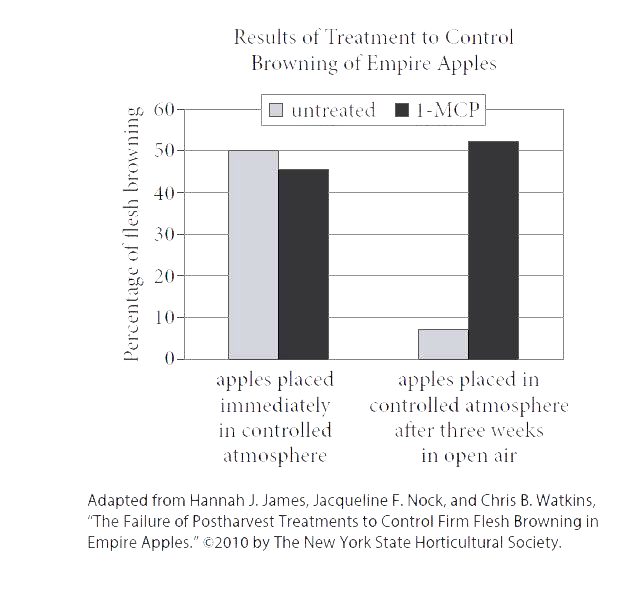
Which choice most effectively combines the underlined sentences?AWhen applied to apples, 1-MCP lengthens storage life by three to four times, allowing producers to sell their apples in the off-season, months after the apples have been harvested.BProducers are allowed to sell their apples months after they have been harvested—in the off-season—because 1-MCP, when applied to apples, lengthens their storage life by three to four timesC1-MCP lengthens storage life, when applied to apples, by three to four times, allowing producers to sell their apples months after the apples have been harvested in the off-season.DMonths after apples have been harvested, producers are allowed to sell their apples, in the off-season, because 1-MCP lengthens storage life when applied to apples by three to four times.How Do You Like Those Apples? Marketed as SmartFresh, the chemical 1-MCP (1-methylcyclopropene) has been used by fruit growers since 2002 in the United States and elsewhere to preserve the crispness and lengthen the storage life of apples and other fruit, which often must travel long distances before being eaten by consumers. 23 1-MCP lengthens storage life by three to four times when applied to apples. This extended life allows producers to sell their apples in the off-season, months after the apples have been harvested. And at a cost of about one cent per pound of apples, 1-MCP is a highly cost-effective treatment. However, 1-MCP is not a panacea for fruit producers or sellers: there are problems and limitations associated with its use.[1] 1-MCP works by limiting a fruit’s production of ethylene, 24 it is a chemical that causes fruit to ripen and eventually rot. [2] While 1-MCP keeps apples 25 tight and crisp for months, it also limits 26 their scent production. [3] This may not be much of a problem with certain kinds of apples that are not naturally very fragrant, such as Granny Smith, but for apples that are prized for their fruity fragrance, such as McIntosh, this can be a problem with consumers, 27 that will reject apples lacking the expected aroma. [4] But some fruits do not respond as well to 1-MCP as others 28 did, and some even respond adversely. [5] Furthermore, some fruits, particularly those that naturally produce a large amount of ethylene, do not respond as well to 1-MCP treatment. [6] Take Bartlett 29 pears, for instance, unless they are treated with exactly the right amount of 1-MCP at exactly the right time, they will remain hard and green until they rot, and consumers who experience this will be unlikely to purchase them again. 30 Finally, researchers have found that 1-MCP actually increases susceptibility to some pathologies in certain apple varieties. For example, Empire apples are prone to a condition that causes the flesh of the apple to turn brown. Traditionally, apple producers have dealt with this problem by leaving the apples in the open air for three weeks before storing them in a controlled atmosphere with tightly regulated temperature, humidity, and carbon dioxide levels. As the graph shows, the flesh of untreated Empire apples that are first stored in the open air undergoes 31 roughly five percent less browning than the flesh of untreated Empire apples that are immediately put into storage in a controlled environment. However, when Empire apples are treated with 1-MCP, 32 their flesh turns brown when the apples are first stored in the open air, though not under other conditions. Although researchers continue to search for the right combination of factors that will keep fruits fresh and attractive, 33 the problem may be that consumers are overly concerned with superficial qualities rather than the actual freshness of the fruit.
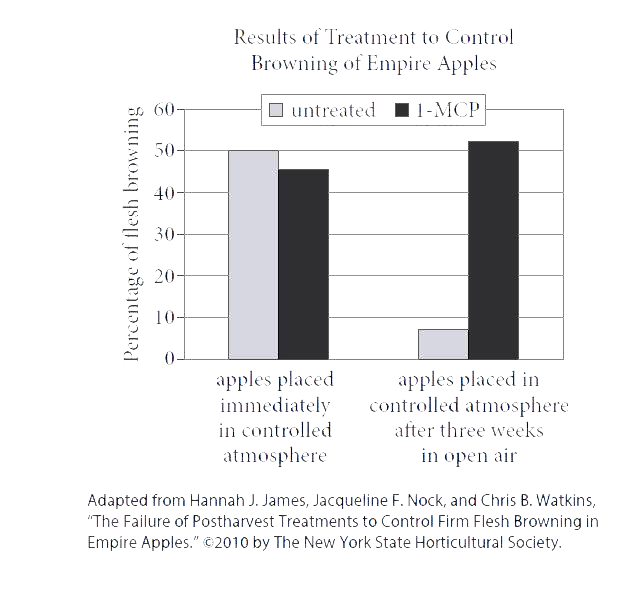 ANO CHANGEBfirmCstiffDtaut
ANO CHANGEBfirmCstiffDtaut
Both male and female gametophytes do not show free-living existence in
View SolutionAssertion: In gymnosperms, the male and female gametophytes do not have indepenent existance.
Reason: They remain within the sporangia retained on the sporophyte.
View SolutionHow Do You Like Those Apples? Marketed as SmartFresh, the chemical 1-MCP (1-methylcyclopropene) has been used by fruit growers since 2002 in the United States and elsewhere to preserve the crispness and lengthen the storage life of apples and other fruit, which often must travel long distances before being eaten by consumers. 23 1-MCP lengthens storage life by three to four times when applied to apples. This extended life allows producers to sell their apples in the off-season, months after the apples have been harvested. And at a cost of about one cent per pound of apples, 1-MCP is a highly cost-effective treatment. However, 1-MCP is not a panacea for fruit producers or sellers: there are problems and limitations associated with its use.[1] 1-MCP works by limiting a fruit’s production of ethylene, 24 it is a chemical that causes fruit to ripen and eventually rot. [2] While 1-MCP keeps apples 25 tight and crisp for months, it also limits 26 their scent production. [3] This may not be much of a problem with certain kinds of apples that are not naturally very fragrant, such as Granny Smith, but for apples that are prized for their fruity fragrance, such as McIntosh, this can be a problem with consumers, 27 that will reject apples lacking the expected aroma. [4] But some fruits do not respond as well to 1-MCP as others 28 did, and some even respond adversely. [5] Furthermore, some fruits, particularly those that naturally produce a large amount of ethylene, do not respond as well to 1-MCP treatment. [6] Take Bartlett 29 pears, for instance, unless they are treated with exactly the right amount of 1-MCP at exactly the right time, they will remain hard and green until they rot, and consumers who experience this will be unlikely to purchase them again. 30 Finally, researchers have found that 1-MCP actually increases susceptibility to some pathologies in certain apple varieties. For example, Empire apples are prone to a condition that causes the flesh of the apple to turn brown. Traditionally, apple producers have dealt with this problem by leaving the apples in the open air for three weeks before storing them in a controlled atmosphere with tightly regulated temperature, humidity, and carbon dioxide levels. As the graph shows, the flesh of untreated Empire apples that are first stored in the open air undergoes 31 roughly five percent less browning than the flesh of untreated Empire apples that are immediately put into storage in a controlled environment. However, when Empire apples are treated with 1-MCP, 32 their flesh turns brown when the apples are first stored in the open air, though not under other conditions. Although researchers continue to search for the right combination of factors that will keep fruits fresh and attractive, 33 the problem may be that consumers are overly concerned with superficial qualities rather than the actual freshness of the fruit.
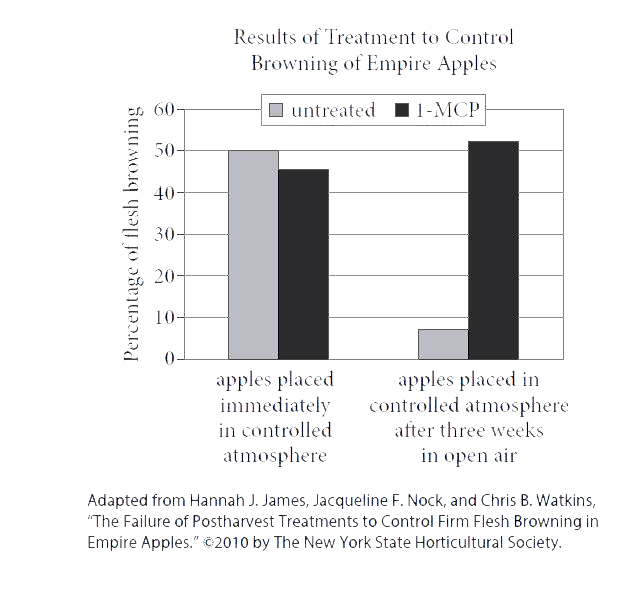
Which choice offers an accurate interpretation of the data in the graph?
View SolutionHow Do You Like Those Apples? Marketed as SmartFresh, the chemical 1-MCP (1-methylcyclopropene) has been used by fruit growers since 2002 in the United States and elsewhere to preserve the crispness and lengthen the storage life of apples and other fruit, which often must travel long distances before being eaten by consumers. 23 1-MCP lengthens storage life by three to four times when applied to apples. This extended life allows producers to sell their apples in the off-season, months after the apples have been harvested. And at a cost of about one cent per pound of apples, 1-MCP is a highly cost-effective treatment. However, 1-MCP is not a panacea for fruit producers or sellers: there are problems and limitations associated with its use.[1] 1-MCP works by limiting a fruit’s production of ethylene, 24 it is a chemical that causes fruit to ripen and eventually rot. [2] While 1-MCP keeps apples 25 tight and crisp for months, it also limits 26 their scent production. [3] This may not be much of a problem with certain kinds of apples that are not naturally very fragrant, such as Granny Smith, but for apples that are prized for their fruity fragrance, such as McIntosh, this can be a problem with consumers, 27 that will reject apples lacking the expected aroma. [4] But some fruits do not respond as well to 1-MCP as others 28 did, and some even respond adversely. [5] Furthermore, some fruits, particularly those that naturally produce a large amount of ethylene, do not respond as well to 1-MCP treatment. [6] Take Bartlett 29 pears, for instance, unless they are treated with exactly the right amount of 1-MCP at exactly the right time, they will remain hard and green until they rot, and consumers who experience this will be unlikely to purchase them again. 30 Finally, researchers have found that 1-MCP actually increases susceptibility to some pathologies in certain apple varieties. For example, Empire apples are prone to a condition that causes the flesh of the apple to turn brown. Traditionally, apple producers have dealt with this problem by leaving the apples in the open air for three weeks before storing them in a controlled atmosphere with tightly regulated temperature, humidity, and carbon dioxide levels. As the graph shows, the flesh of untreated Empire apples that are first stored in the open air undergoes 31 roughly five percent less browning than the flesh of untreated Empire apples that are immediately put into storage in a controlled environment. However, when Empire apples are treated with 1-MCP, 32 their flesh turns brown when the apples are first stored in the open air, though not under other conditions. Although researchers continue to search for the right combination of factors that will keep fruits fresh and attractive, 33 the problem may be that consumers are overly concerned with superficial qualities rather than the actual freshness of the fruit.
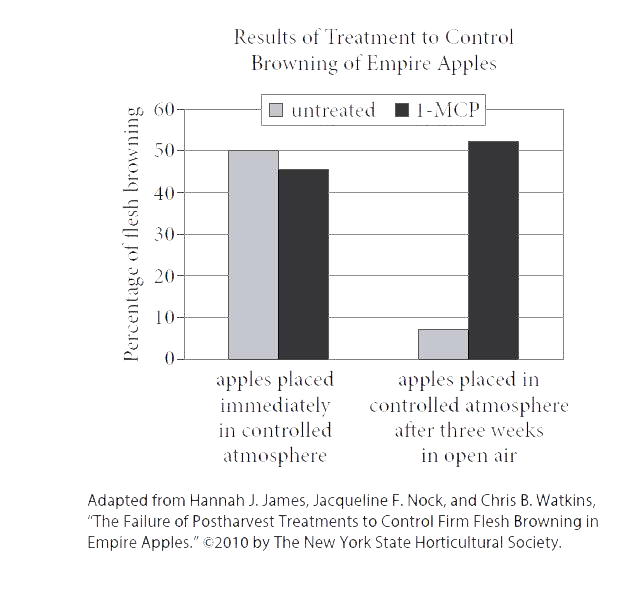
To make this paragraph most logical sentcence 4 should be placed
View SolutionHow Do You Like Those Apples? Marketed as SmartFresh, the chemical 1-MCP (1-methylcyclopropene) has been used by fruit growers since 2002 in the United States and elsewhere to preserve the crispness and lengthen the storage life of apples and other fruit, which often must travel long distances before being eaten by consumers. 23 1-MCP lengthens storage life by three to four times when applied to apples. This extended life allows producers to sell their apples in the off-season, months after the apples have been harvested. And at a cost of about one cent per pound of apples, 1-MCP is a highly cost-effective treatment. However, 1-MCP is not a panacea for fruit producers or sellers: there are problems and limitations associated with its use.[1] 1-MCP works by limiting a fruit’s production of ethylene, 24 it is a chemical that causes fruit to ripen and eventually rot. [2] While 1-MCP keeps apples 25 tight and crisp for months, it also limits 26 their scent production. [3] This may not be much of a problem with certain kinds of apples that are not naturally very fragrant, such as Granny Smith, but for apples that are prized for their fruity fragrance, such as McIntosh, this can be a problem with consumers, 27 that will reject apples lacking the expected aroma. [4] But some fruits do not respond as well to 1-MCP as others 28 did, and some even respond adversely. [5] Furthermore, some fruits, particularly those that naturally produce a large amount of ethylene, do not respond as well to 1-MCP treatment. [6] Take Bartlett 29 pears, for instance, unless they are treated with exactly the right amount of 1-MCP at exactly the right time, they will remain hard and green until they rot, and consumers who experience this will be unlikely to purchase them again. 30 Finally, researchers have found that 1-MCP actually increases susceptibility to some pathologies in certain apple varieties. For example, Empire apples are prone to a condition that causes the flesh of the apple to turn brown. Traditionally, apple producers have dealt with this problem by leaving the apples in the open air for three weeks before storing them in a controlled atmosphere with tightly regulated temperature, humidity, and carbon dioxide levels. As the graph shows, the flesh of untreated Empire apples that are first stored in the open air undergoes 31 roughly five percent less browning than the flesh of untreated Empire apples that are immediately put into storage in a controlled environment. However, when Empire apples are treated with 1-MCP, 32 their flesh turns brown when the apples are first stored in the open air, though not under other conditions. Although researchers continue to search for the right combination of factors that will keep fruits fresh and attractive, 33 the problem may be that consumers are overly concerned with superficial qualities rather than the actual freshness of the fruit.
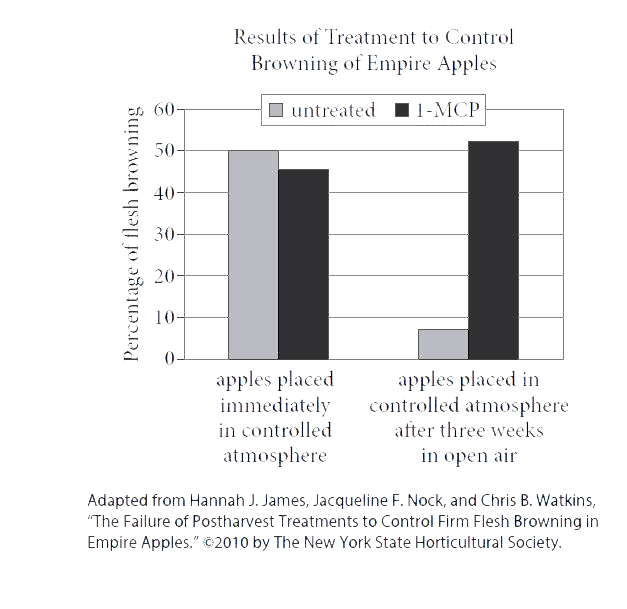
Which choice offers an accurate interpretation of the data in the graph?
View Solution
